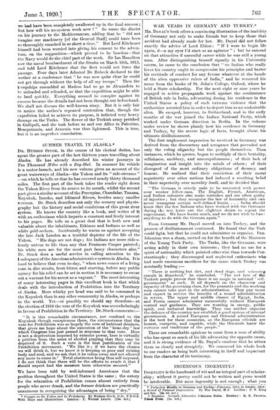SUMMER TRAVEL IN ALASKA.*
Da. HUDSON &rum, in the course of his clerical duties, has spent the greater part of the last thirteen years travelling about Alaska. He has already described his winter journeys in Ten Thousand Miles with a Dog-Sled. In summer his vehicle is a motor-launch, and his new volume gives an account of the
great waterways of Alaska—the Yukon and its " side-streams " —on which he tells us that he has covered nearly thirty thousand miles. The first part of the book takes the reader right down the Yukon River from its source to its mouth, whilst the second part gives a similar account of the Porcupine, Chandalar, Tanana, Koyukuk, Innoko, and Iditarod Rivers, besides many smaller streams. Dr. Stuck describes not only the scenery and physio- graphy but the history and social conditions of this great river system. He knows the country like a book, and writes of it with an enthusiasm which imparts a constant and lively interest to his pages. He tells us a great deal that is both new and valuable about the inhabitants, Eskimos and Indians as well as white gold-seekers. Incidentally he warns us against accepting the late Jack London as a truthful depicter of the life of the Yukon. " His dogs are not dogs ; his Indians are more ridicu- lously untrue to life than any that Fenimore Cooper painted ; his white men are for the most part fancy characters also." Dr. Stuck does a useful service in calling attention to the iadequacy of the American administrativ e system in Alaska. It is hard to believe that even to-day, " when news comes of a living man in dire straits, frost-bitten and starving, before any public agency for his relief can be set in motion it is necessary to swear out a warrant for his arrest as a vagrant." The most interesting of many interesting pages in this excellent book is that which deals with the introduction of Prohibition into the Territory of Alaska. More whisky per head was said to be consumed in the Koyukuk than in any other community in Alaska, or perhaps in the world. Yet—or possibly we should say therefore—at
the election of 1916 the vote of the Koyukuk was overwhelmingly in favour of Prohibition in the Territory. Dr. Stuck comments:— "It is this remarkable circumstance, not confined to the Koyukuk though conspicuous there, the circumstance that the vote for Prohibition was so largely the vote of habitual drinkers, that gives me hope about the execution of the bone-dry' law which Congress has just passed in response to that vote. Here is not a deprivation imposed by exterior power, here is virtually a petition from the users of alcohol praying that they may be deprived of it. Such a vote is the best justification of the Prohibition movement. ' We like it ; if we have the chance we will drink it, but we know it is keeping us poor and ruining body and soul, and we ask that it be taken away and not allowed any more to come in.' Total abstinence being thus self-imposed, I do not think that there will be the efforts to evade it that I should expect had the measure been otherwise secured."
We have been told by well-informed Americans that the position throughout the United States is the same ; the outcry for the relaxation of Prohibition comes almost entirely from people who never drank, and the former drinkers are practically unanimous in recognizing the advantages of being " dry."
• Voyages on the Yukon and its Tributaries. By Hudson Stuck. D.D.. With Maps and Illustrations. London : T. Werner Laurie. [25s. net.]


































 Previous page
Previous page